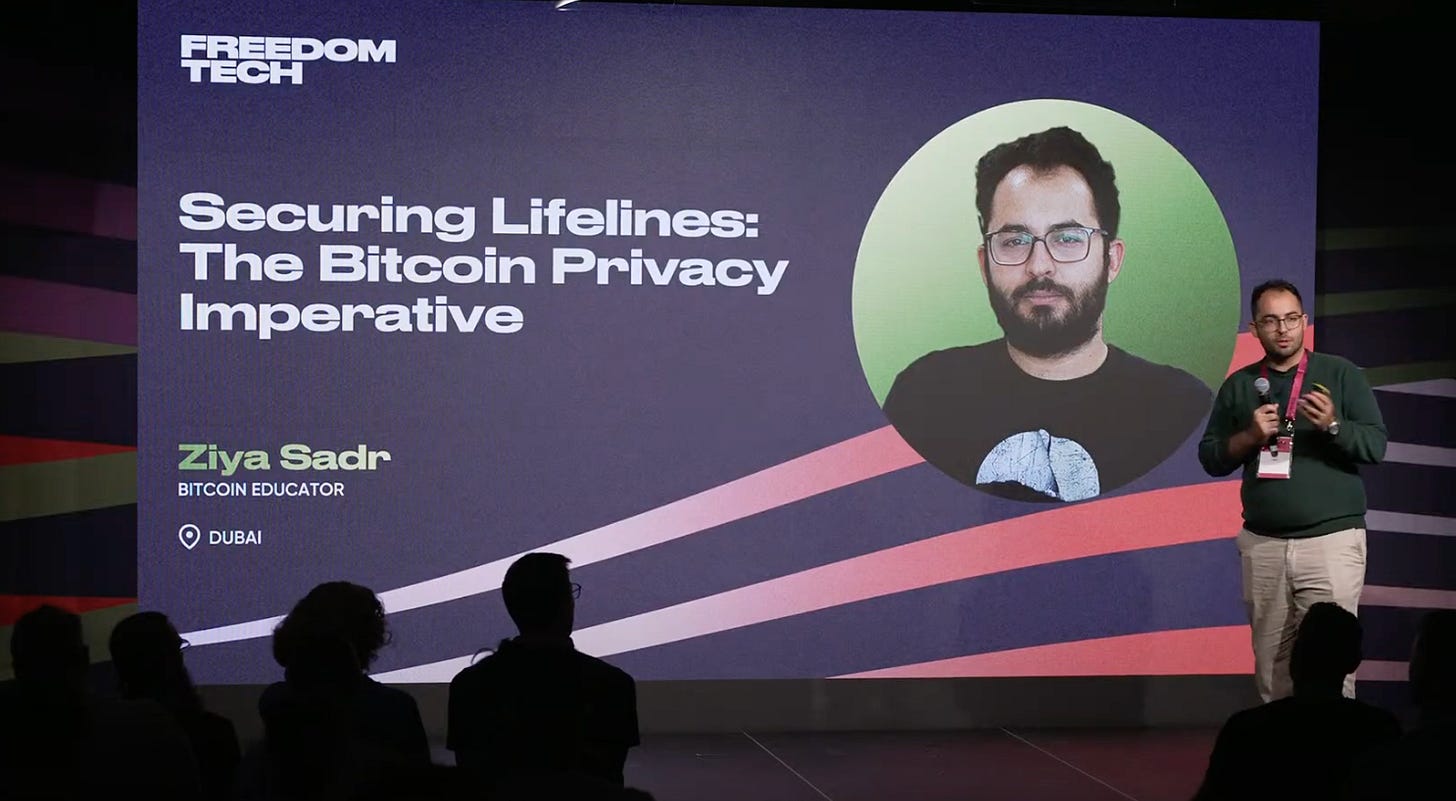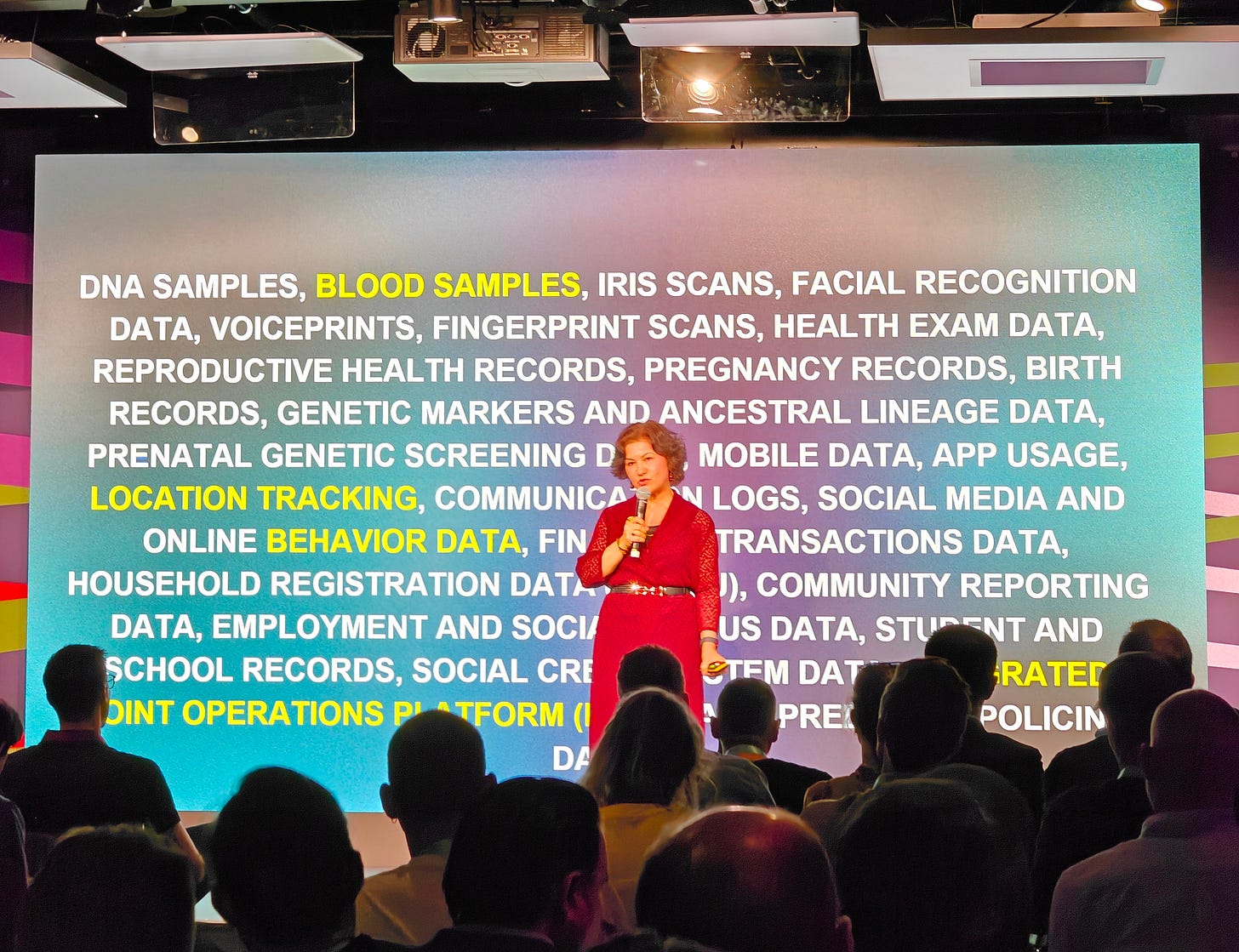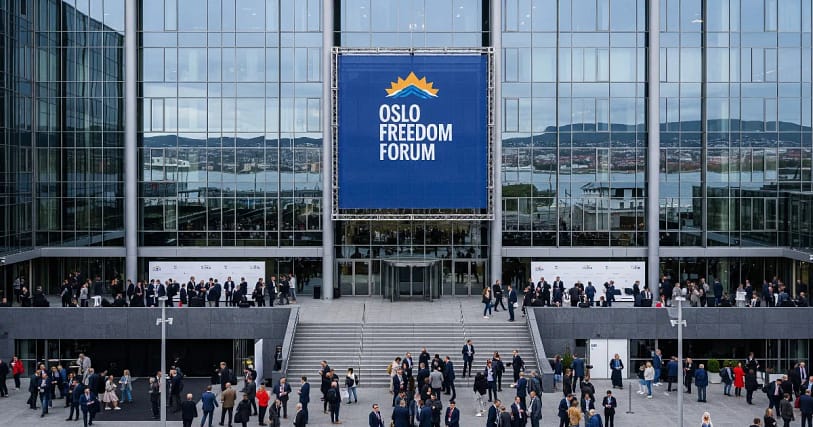As I step onto the aircraft leaving Gardermoen Airport in Oslo, Norway, the burden and heat of the previous week settles into my chest.
The Oslo Freedom Forum just isn’t a convention. It’s not a summit. It’s one thing tougher to call and even tougher to explain — a convergence of braveness, reality and defiance that burns via the noise of the fashionable world and provides you no selection however to hear, really feel and act.
For the second time, I depart this metropolis extra satisfied than ever that one thing unstoppable is rising. That amid the censorship, surveillance and state repression spreading throughout the globe, there’s a countervailing drive rooted in humanity, accelerated by know-how and led by those that’ve already paid the value for talking out.
The Discussion board doesn’t commerce in empty optimism. It delivers a unique type of hope, cast from lived expertise and stitched collectively by individuals who have been in the dead of night and nonetheless select to see the sunshine. A hope borne from the tales of people who’ve lived via the worst an authoritarian regime can do and nonetheless select to battle for the liberty of others. The experiences shared had been arduous. At instances, devastating. However they weren’t supplied for pity. They had been calls to motion.
Simply days after she was kidnapped, blindfolded, tortured, and sexually assaulted in a Tanzanian jail cell, Agather Atuhaire stood in entrance of a crowd of strangers and advised her story.
Her voice didn’t tremble.
The Ugandan journalist and lawyer had traveled to Tanzania in solidarity with fellow East African dissidents, solely to be disappeared in a black van alongside Kenyan activist Boniface Mwangi.
And but, in opposition to all odds, she got here again. Not simply to her house in Uganda, but additionally to the stage in Oslo, the place she spoke calmly and clearly about what it means to inform the reality beneath a dictatorship.
Her presentation, “The Digital Free Speech Crackdown in Uganda,” laid naked the authoritarian playbook: social media blackouts, propaganda campaigns, surveillance of journalists and the gradual monetary asphyxiation of unbiased media. When the federal government doesn’t like a narrative, it merely blocks the platform or web site. When a journalist digs too deep, they disappear for some time. Or without end. Atuhaire painted an image many wrestle to even think about.
And but, after every little thing, she didn’t simply recount these struggles. She seemed out on the crowd and thanked the open supply builders and contributors who write code and create instruments that make it attainable for activists like her to talk, transfer cash and set up beneath regimes that need them silenced, or worse.
(Ugandan journalist and lawyer, Agather Atuhaire, speaks throughout the Freedom Tech monitor on the 2025 Oslo Freedom Discussion board.)
From Iran, unbiased Bitcoin educator Ziya Sadr reminded us that monetary privateness just isn’t a luxurious however a crucial lifeline for these dealing with the monetary repression by oppressive rulers. Sadr’s detainment throughout the 2022 Women, Life, Freedom motion following the homicide of Mahsa Amini by the Iranian regime is a testomony to that. With out monetary privateness, activists’ actions, connections and funds are uncovered to a regime outfitted with widespread monetary controls and a complicated, restrictive web firewall that rivals even China’s.
The end result is likely one of the most repressive digital environments on this planet. And if that wasn’t sufficient, the Iranian rial currency has misplaced greater than 80% of its worth in only a few years.
Towards this backdrop, Iranians are utilizing bitcoin as undebasable financial savings, and to purchase digital providers like VPNs so as to entry the open web. However even that act, simply reaching the surface world, requires a stage of privacy most of us take without any consideration.
In his presentation, “Securing Lifelines: The Bitcoin Privacy Imperative,” Sadr shared that many Iranians flip to Bitcoin Coinjoins, a privateness approach that breaks the hyperlink between Bitcoin transaction inputs. Coinjoins protect consumer transaction privateness and, extra importantly, protect Iranians from the surveillance and retaliation of a regime who punishes anybody attempting to entry info past its tightly managed digital areas. Using Coinjoins is turning into tougher as world authorized strain mounts in opposition to open supply builders, and within the aftermath of the Samourai developer arrests, privateness protocols like Whirlpool are unworkable.
As we speak, Sadr is studying extra about extra Bitcoin privateness instruments, together with Paykoin, a privateness technique that permits two customers to contribute an enter to a Bitcoin transaction. Payjoin breaks frequent chain evaluation heuristics and conceals the sender and receiver of a transaction in addition to the fee quantity. Then there’s ecash, a type of digital money backed by Bitcoin that permits very non-public, on a regular basis funds with the custodial trade-off of trusting mints (entities that problem and redeem ecash tokens) to retailer consumer funds.
The continued improvement of those protocols is essential for Iranians, who stay beneath a authorities that not solely tracks and surveils digital conduct, but additionally imposes automatic fines on ladies for violating hijab guidelines and manipulates foreign money alternate charges to revenue off residents’ financial savings. For hundreds of thousands in Iran, bitcoin provides a final line of protection in opposition to a collapsing foreign money, intrusive surveillance and whole monetary repression.

(Unbiased Iranian Bitcoin educator, Ziya Sadr, speaks throughout the Freedom Tech monitor on the Oslo Freedom Discussion board.)
Venezuelan opposition chief Leopoldo López took the stage on the 2025 Oslo Freedom Discussion board not as a politician, however as a witness to what occurs when a state turns its establishments into additional tendrils of its repression machine.
After Nicolás Maduro stole Venezuela’s 2024 elections, López watched 1000’s of his fellow individuals — activists, college students, journalists, opposition members and attorneys — get arrested, disappeared or pressured into exile. The regime blocked entry to social media, revoked passports, criminalized dissent and used the monetary system as a method of controlling the inhabitants.
Amid this digital repression and Venezuela’s 162% inflation price, López sees bitcoin (decentralized cash) and Nostr (decentralized social media) as lifelines. When dictators shut down the web or freeze your checking account, options which can be open supply, decentralized, uncensorable and accessible turn out to be extra vital than ever for the survival of democracy and freedom.
“Decentralized resistance is the convergence of individuals, Bitcoin, Nostr, and AI.
Individuals, it’s in regards to the heart and the top of what we’re doing.
Courageous men and women who sacrifice their freedom, who take dangers, who’re prepared to battle for different individuals.
If it’s not about individuals, know-how wouldn’t be one thing price combating for.
Bitcoin is freedom cash. It’s decentralized, no person controls it, no person can cease it, it might transfer round with out borders.”
(Venezuelan Opposition Chief Leopoldo López throughout the Freedom Tech monitor on the 2025 Oslo Freedom Discussion board.)
For many years, Paraguay’s biggest pure useful resource, hydroelectric energy, has flowed overseas via worldwide contracts, fueling improvement in neighboring nations like Brazil and Argentina whereas one in four Paraguayans remained trapped in poverty. Paraguay’s Itaipu Dam, one of many largest on this planet, has lengthy symbolized this paradox: a river of power diverted away from the very individuals who want it most.
Björn Schmidtke and Delia Garcete of Penguin Group are flipping that script.
In a landmark transfer, they secured Paraguay’s first 100-megawatt energy buy settlement, marking the start of a daring experiment to reclaim that power for the individuals of Paraguay. As a substitute of promoting it off to international powers, they use it to mine Bitcoin — and the proceeds go to Paraguay’s youth.

(Itaipu dam, Paraguay)
Out of the warmth of buzzing ASICs and the roar of the Itaipu generators rises Penguin Academy, a free software program improvement college that equips younger Paraguayans with coding, improvement and technical expertise. Over 10,000 college students have utilized, together with 800 ladies; greater than 3,000 have already graduated. And over 85% of the graduates from their Code Professional program now work within the tech business.
What was as soon as wasted or exported is now being remodeled into freedom and a future. By means of bitcoin, Paraguay’s stranded energy is discovering its method house.
Rushan Abbas is a Uyghur activist who has spent years elevating the alarm in regards to the Chinese language Communist Get together’s marketing campaign to erase her individuals. In the course of the Freedom Tech monitor, she spoke not simply as a human rights advocate however as a sister whose sibling, Dr. Gulshan Abbas, was kidnapped by the CCP in 2018 and hasn’t been heard from since. Her voice was calm, however her phrases had been heavy.
Abbas described a area become a digital and bodily jail. The Uyghur homeland, East Turkistan, has been deliberately remodeled into one of many world’s most refined police states, the place mass surveillance, facial recognition programs, police checkpoints, asset seizure, organized marriage, sterilization and compelled labor are used not simply to manage the Uyghur inhabitants, however to suppress them out of existence.
As Rushan describes it: “Break their lineage, break their roots, break their connections, and break their origins.”
Rushan made clear that financial management is central to the CCP’s technique. Uyghurs have their belongings and financial institution accounts frozen, their land seized and their houses stolen. They’re stripped of any means to avoid wasting, transact or construct generational wealth, and are pressured into government-run labor schemes beneath the guise of “poverty alleviation.”
Rushan reminds us that what’s occurring to the Uyghurs just isn’t summary. It’s a focused, systematic erasure carried out with weaponized know-how and monetary repression. Her sister’s disappearance is one in all hundreds of thousands of silenced lives, however she refuses to let or not it’s forgotten. In Oslo, Rushan stood not simply as a witness, however her phrases served as a warning: When a authorities can monitor each transaction, surveil each citizen and management each motion, it doesn’t simply repress however totally dismantles the foundations of a individuals’s identification, autonomy and future.

(Uyghur activist Rushan Abbas speaks throughout the Freedom Tech monitor on the 2025 Oslo Freedom Discussion board.)
For these causes and extra, you don’t depart the Oslo Freedom Discussion board feeling defeated. You permit reminded that reality is extra highly effective than propaganda, that code can shield life and that resistance isn’t simply attainable — it’s already occurring.
And should you’re lucky sufficient to stay in a spot the place talking freely or transferring cash isn’t a life-risking act, you’re reminded of the privilege that comes with that freedom and the duty you need to stand with those that are nonetheless combating for it.
This yr, I felt a noticeable pulse of momentum round freedom tech. As we noticed above, human rights defenders and dissidents didn’t simply speak in regards to the repression they endured. They emphasised the optimism in regards to the instruments that assist them peacefully battle again: Bitcoin, Nostr, privateness instruments, open supply AI fashions, uncensorable VPNs — instruments that work within the shadows, beneath firewalls, round embargoes and past borders. Instruments that construct a parallel system, the place the appropriate to transact, talk, set up and resist can’t be revoked on the press of a button.
These are the devices protecting actions alive, getting cash to dissidents and defending voices in danger. And behind each instrument is a quiet builder, a pseudonymous contributor or an open supply developer who could by no means take the stage however is simply as a lot part of the story.
The Oslo Freedom Discussion board is not only a gathering of voices. It’s a frontline, a spot the place the longer term is crafted by those that refuse to present in. And what emerges from that convergence is a straightforward, plain reality: Authoritarianism adapts, however so will we. With Bitcoin, with open supply instruments, with decentralized networks, with unstoppable braveness.
At 30,000 toes, nicely above the noise and borders they attempt to implement, one factor is obvious: No authoritarian regime, irrespective of how brutal or nicely funded, has ever succeeded in stamping out the human need to be free. The Oslo Freedom Discussion board is proof of that. And should you’re paying consideration, it’s additionally a glimpse into what comes subsequent.
This isn’t the top. It’s only the start of the following chapter. One written not by the highly effective, however by the free.
Onward.
